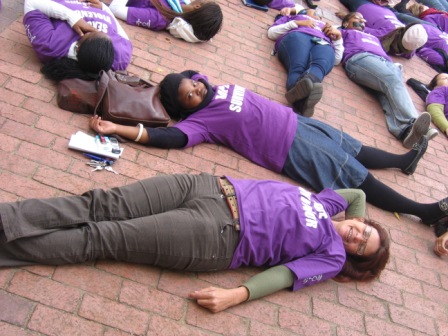
Last week 1500 Rhodes students and staff called on all South Africans to break the cycle of sexual violence. “Stand up against sexual violence and help create a world where women are truly equal, where they are free to walk where they want to, when they want to, wearing what they want to. Until we achieve those goals – women will remain silenced,” they said.
The first Sexual Violence = Silence protest, organised by the 1-in-9 Campaign in conjunction with the Dean of Students Office, took place on the Rhodes University campus in 2007. That year, eight women braved the gauntlet of a disbelieving, unknowing and often ignorant student body and public. With their mouths taped shut to represent the 8 out of 9 rape survivors who are too afraid to report their violation, they spent the day enduring stares and in some cases abuse.
This year, 2011, marked the fifth year of the protest, and this year, organiser Larissa Klazinga addressed a crowd of 1500 people who had gathered together to say to society, and its organs of law and justice, that enough is enough. “Stop the war on woman's bodies,” they chanted.
Sexual Violence = Silence has become the largest protest on the Rhodes campus; even after five years the sight of young women with their mouths duct-taped shut has the power to shock and, hopefully, inform those around them.
The protest is staged every year to draw attention to the fact that Government statistics show 72 500 women are raped each year in South Africa, a frightening and totally unacceptable number. Even more dismaying is the fact that only 4% of perpetrators are successfully prosecuted, and less than 0.5% of these serve jail time. It gets worse, however. Government statistics reflect only those rapes reported to the police. According to research, carried out by the Medical Research Council in 2005, only one rape in nine is ever reported, and, by a process of extrapolation, one can see that therefore the true incidence of rape within our country is closer to 650 000 annually.
It is this statistic which gives the 1 in 9 Campaign its name.
The purpose of the Sexual Silence = Violence protest is to highlight state silence around rape, and confront government and authority with its inability (or unwillingness) to support rape survivors and prosecute rapists. It is also a symbolic act to represent the 8 in 9 survivors who do not report their violation.
There is a lot to be dissatisfied with in the world today. In South Africa, protests against poor service delivery, lack of housing and lack of employment are common. Just ten days ago a group of irate residents marched on the Makana Municipality with their overflowing containers of human waste, demanding an end to the bucket system and the installation of proper toilets.
Somehow, sexual crimes are given less importance than these issues. The so-called “corrective rape” of lesbian women is happening all around us, all the time. Child rape and sexual abuse is rife.
Figures show that, in South Africa, if a woman lives to be 50 years old, she has an almost 100% chance of being raped at least once.
While the 'silent women' were possibly the most visible protestors, there were three other types of participants, the bravest of which were those who wear a purple T-shirt emblazoned with two words: Rape Survivor. These are women who have broken the silence, and who are speaking out to help others. Their numbers increase every year.
Women and men who are there to support them, and to support the cause, wear their Solidarity with Women who Speak Out T-shirts with pride, many of them walking with and supporting a silent friend, who will not eat or drink for the twelve-hour duration of the protest.
The Take Back the Night march which lead the protestors triumphantly back on to the Rhodes University campus, and the supper provided for them at the Great Hall, marked the end of their day trapped without a voice.
The 8 in 9 are not so lucky. For them, the breaking of the silence will take more, much more, than the removing of a piece of tape. Rape limits human potential. It silences women, and keeps them isolated and afraid. Victims of sexual violence are denied the basic right of Freedom of Speech.
Story by Jeannie McKeown
